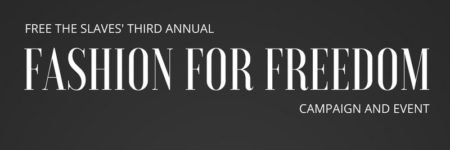Free the Slaves is proud to announce that renowned labor and employment lawyer Aaron Halegua will be joining our Fashion for Freedom Event in New York this coming Saturday, July 28! Learn more about our impressive panelist below:
“It is important to raise awareness about the abusive labor conditions and existence of forced labor in some of the global supply chains that make our electronics, clothing, footwear, and other goods. Global brands have significant power to curb these abuses.”
That’s how Aaron Halegua, lawyer and consultant, emphasizes the urgent need for consumers to see through corporate supply chains. Halegua is the founding member of a law firm in New York City that practices in the areas of employment law and general litigation.
Halegua’s interest in labor rights goes back to his early career days. After college, Halegua moved to Beijing to research the use of mediation to informally resolve disputes. It was here that he was introduced to an NGO that was assisting migrant workers in recovering their owed wages. At that time, it was fairly routine for construction workers to go a whole year without getting paid – only to then discover that their employer had fled or disappeared.
“I was deeply moved by these injustices and eager to learn what could be done to remedy such abuses. That was the beginning of what has become a 14-year interest in labor and employment law,” Halegua says.
Throughout his career, Halegua has continued to focus on Asia. “I studied Mandarin in college and lived in China for two years before attending law school. In addition to doing a good deal of work in China and the United States, I have also now worked on labor issues in Malaysia, Myanmar, and Thailand,” he says.
For the past 18 months, Halegua has been involved in assisting more than 2,400 trafficked and exploited Chinese construction workers in Saipan.
“The workers paid thousands of dollars in recruitment fees based on the promise of a great job in America. In reality, they worked 13-hour days with hardly a day off, received below minimum wage, lived in horrid conditions, were stripped of their passports, and faced atrocious safety conditions – resulting in numerous injuries and even worker deaths. Having borrowed money at high-interest rates to pay their recruiters, and lacking legal work status, these workers then felt trapped in these abusive jobs,” he says.
Halegua emphasizes the fact that coercion is what distinguishes forced labor or labor trafficking from other types of labor abuse. “It is important to view coercion as a continuum. Physically restraining a worker from leaving a dormitory or job, or threatening physical harm if one flees, are extreme forms of coercion; but not the only types. Coercion can arise from withholding a person’s travel or identity documents, threatening that someone will be deported by immigration authorities, or owing a large debt to mafia members or loan sharks in one’s home country. Therefore, labor trafficking and forced labor are far more pervasive than many people realize,” he says.
Free the Slaves is determined to use this summer’s Fashion for Freedom event to push for more transparency in fashion supply chains and encourage the consumers to use the power of their purchases to support ethical brands.
“My hope is that the people in [that] room, in their capacities as consumers, advocates, and citizens, will push brands and other stakeholders to take seriously their role in ending labor exploitation,” Halegua says.
Learn more about the work Halegua’s firm does here. Come hear him speak at the Fashion for Freedom Event July 28 in New York City. Tickets are on sale now!

